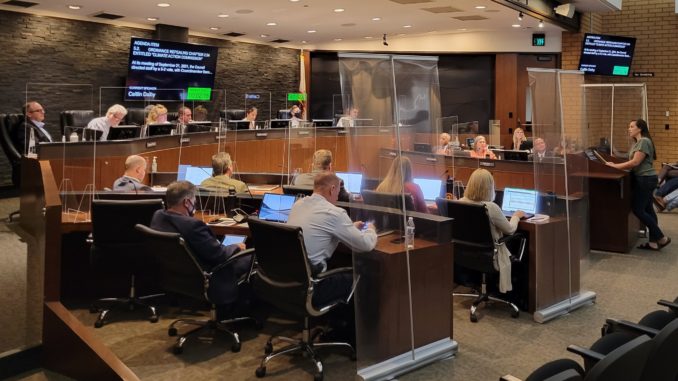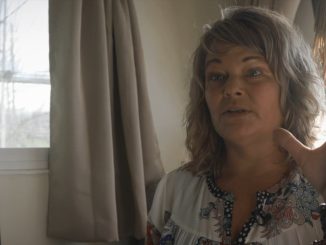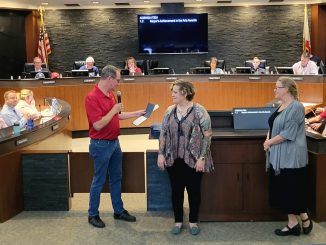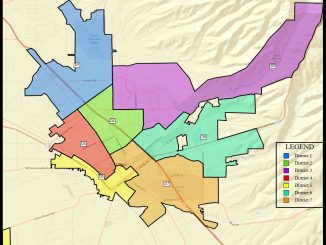
Chicoans who attended or tuned into their City Council’s meeting Tuesday night (Oct. 5) saw a real-world episode of The Twilight Zone, as the conservative majority flipped its script in a series of votes.
In complete reversals from previous positions, council members decided against downgrading the Climate Action Commission to an ad hoc committee, and reinstated a shelter crisis declaration that they let lapse June 30. They also proffered city support for Everhart Village, a tiny home community project by Chico Housing Action Team for homeless people suffering from mental illness, by offsetting the cost of sewer connection.
Councilwoman Alex Brown, the lone progressive, said during the shelter crisis discussion that she was “feeling whiplash, as I’m sure most of the community is,” by the sudden shift. She told the CN&R after the session that the climate commission deliberation went differently than she’d anticipated, due to public outcry, but her colleagues’ tack on homelessness fit into a bigger picture.
“Here’s the deal,” Brown elaborated. “The word ‘strategy’ was thrown around a lot tonight. I think the strategy here is much bigger than our response to homelessness. It’s also a public relations campaign, kind of in a way that doesn’t make this council look like hypocrites. Unfortunately, they still do if you look closely enough, but the messaging is swift as it relates to the litigation we’re in [Warren v. City of Chico], whatever efforts are being made to do what I would call the right thing, in a situation where there is no other choice.”
As the declaration was set to expire, council members heard at multiple meetings from citizens and service providers advocating for its extension. The conservative majority decided to let it lapse on an ideological-split vote June 15. Tuesday night, so complete was the turnaround that Larry Wahl—a former councilman and county supervisor—was among the conservatives from the community expressing support from the public-speaker podium.
“Common sense, common sense, something we all love,” Wahl told the council. “Passing this resolution is a no-brainer.” Noting that the judge in the federal lawsuit would likely “look more favorably” on the city with the declaration in place, he added: “Your constituents are asking for it, and I’m representing quite a few of them.”
Commission decision
At the previous meeting (Sept. 21), discussion about filling vacancies on the Climate Action Commission went in a whole other direction when the council voted 5-2—Brown and recently appointed Dale Bennett dissenting—to turn the commission into an ad hoc committee. That would require an ordinance, which City Attorney Vince Ewing drafted for a first reading Tuesday.
Council members’ questions of Ewing and city staff focused mostly on the difference between the two types of panels. Bottom line, a standing committee such as a city board or commission is permanent with regular meetings and members appointed by the council, while ad hoc committees have a “sunset” (i.e., end point for their scope of work) and fall under the mayor’s purview.
Speakers latched onto the notion of a set time-frame for the commission, which focuses on state mandates for reducing greenhouse gas emissions and planning for climate action and climate resiliency. Jared Geiser was one of several community members who said, “There’s no sunset on climate action.”
In all, between speakers and those who submitted comments online, 13 of 15 opposed changing the commission’s status. Councilman Sean Morgan predicted his motion would fail but moved to turn the commission into an ad hoc committee; receiving no second, the motion died, preserving the status quo, though Mayor Andrew Coolidge instructed the City Clerk’s office to conduct a fresh recruitment for commissioners.
“Given the last public meeting, where council voted to disband the Climate Action Commission, I came to this meeting fully prepared to watch that happen,” Brown told the CN&R. “The fact that it didn’t I think is a testament to the community, who responded adamantly that such an action was inappropriate given the crisis that we’re facing—and also unnecessary.
“So I was surprised to see the that council seemed to vote in lockstep tonight to not go forward with the action that they voted in lock step at our last meeting to move forward with, but I can’t say I’m disappointed.”
Caitlin Dalby, executive director of the Butte Environmental Council, who’d addressed the council in favor of continuing the commission, echoed Brown’s sentiments.
“I would say I’m pleasantly relieved,” she told the CN&R. “Based on the last meeting, I thought it was going to be pretty cut and dry, that they were going to keep moving along with the process.” After Morgan’s motion met with silence, “my eyebrows went up.”
Shelter crisis
The opinion Morgan expressed about the climate commission—“I understand it makes you feel good, but it doesn’t make anything happen”—carried over to the shelter crisis declaration, which he supported but with a strong caveat.
“The previous shelter crisis [declaration] didn’t bring in a lot of change or dollars,” he said. “I’m not sure this one will.”
However: “The city is like Apollo XII—fighting Boise v. Martin and fighting it alone.” Bound by confidentiality, Morgan continued, he couldn’t reveal the city’s strategy, but that strategy includes this declaration—and any council member who’d vote against it should also agendize replacing the City Hall management team that crafted the strategy.
His colleagues shared his stance, with varying degrees of reservation. Vice Mayor Kasey Reynolds said she was “beyond apprehensive” adopting the declaration, citing state requirements such as reports. “This likely won’t bring any money to the community,” she said, “but surely will cost us money because of all the mandates.” Coolidge, who voted for the first declaration during his first council stint, also asserted that “nothing happened” last time—“no money, no solutions, as problems got progressively worse.”
Seven of 10 submitted comments opposed redeclaring a shelter crisis, but 11 of 13 speakers supported it. Along with Wahl and local developer Tom van Overbeek, proponents included Laura Cootsona, executive director of the Jesus Center, who pointed to funding secured by service providers under the previous declaration; Leslie Johnson of CHAT; and Planning Commissioner Bryce Goldstein, who posed, “I’m just wondering why the change of mind?”
Referring to the earlier decision on the commission, Goldstein added: “Hopefully we can agree on two things tonight.”
The council voted unanimously (on a motion by Morgan, seconded by Michael O’Brien) to adopt the declaration drafted by Ewing. Brown said she “plugged [her] nose” in voting yes—not because of the action itself but because of the circumstances.
“The mayor talked about this not doing anything,” Brown told the CN&R. “The reality is Chico declaring a shelter crisis may not have meant that we used city land to build any sort of shelter in the past; it did enable Chico-based nonprofit organizations to receive funding from the state that has absolutely had a major impact on the programs in our community that serve the unsheltered population. So that’s blatantly false.
“There seems to be a tone that we’re being forced to take this action in the name of strategy. The reality is our strategy should have always included the resources and tools that a shelter crisis declaration gives us [as a city] and gives service providers.”
Additionally, one service provider, CHAT, got a direct boost from the city in the form of approximately $40,000. Councilwoman Deepika Tandon requested the city waive sewer connection fees, projected at $41,545. City Manager Mark Orme recommended a fund allocation for the project, rather than a waiver that Morgan cautioned could establish a precedent. The council agreed unanimously, though should the cost prove significantly higher, a subsequent vote on the allocation could reverse the decision.
Asked afterward whether she felt this meeting represented a unique occurrence or the start of a pendulum swing, Brown replied: “I want to think that doing the right thing, the evidence-based thing, is the North Star for people who make decisions on policy. It has been stated many times publicly by members of this council that getting out of litigation has been their priority, their North Star. Once that litigation is over, I can’t say that I have any faith that doing the right thing will be on the top of the priorities list.”




Be the first to comment